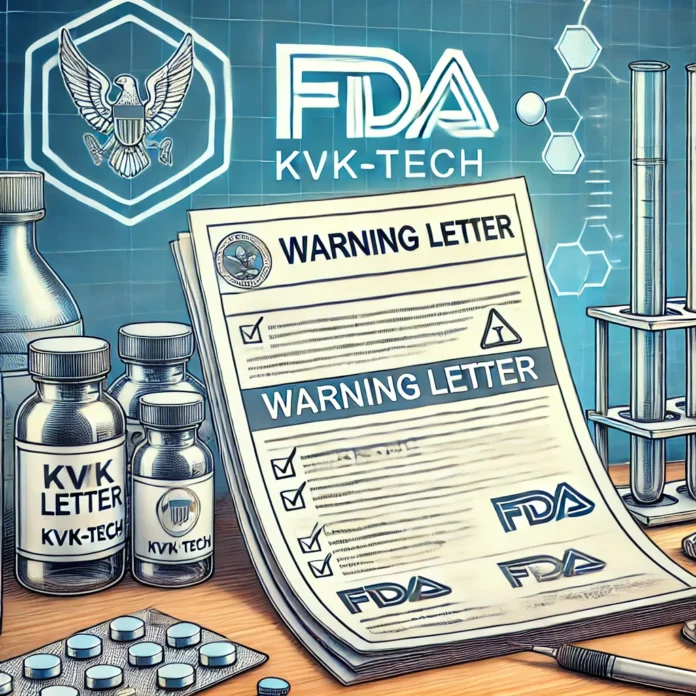Introduction
The KVK-Tech warning letter from the FDA has sparked important discussions about pharmaceutical practices and patient safety. When a pharmaceutical company like KVK-Tech receives a warning letter from the U.S. Food and Drug Administration (FDA), it raises questions not only about the company’s practices but also about the broader implications for patient safety and industry standards. In this article, we’ll unpack what happened, why it matters, and what’s next for KVK-Tech in a conversational and easy-to-follow way.
What Is the KVK-Tech Warning Letter About?
Let’s start with the basics. A warning letter from the FDA is not just a slap on the wrist. It’s an official notice indicating that the agency has found significant violations of regulatory requirements. These could involve manufacturing processes, labeling, or even how a company tests its products. Essentially, it’s a formal way of saying, “Fix this, and fast.”
For KVK-Tech, the letter was a wake-up call. But what exactly led to this warning?
Key Issues in KVK-Tech’s Warning Letter
According to the FDA, KVK-Tech’s warning letter detailed several critical issues. Here are some of the major points:
- Manufacturing Processes: The FDA cited deficiencies in KVK-Tech’s manufacturing practices. This often relates to processes that don’t meet the required Good Manufacturing Practices (GMP) standards, which are essential to ensure drug quality and safety.
- Quality Control: There were concerns about how KVK-Tech monitors the quality of its products. For example, if a company doesn’t have robust systems in place to detect and address potential issues, it could lead to compromised products reaching patients.
- Documentation and Record-Keeping: Another common problem cited in warning letters is poor documentation. The FDA expects pharmaceutical companies to maintain meticulous records to ensure transparency and accountability.
Why Does This Matter?
You might be wondering, “Why should I care about KVK-Tech’s warning letter?” Well, it’s more important than you might think.
- Patient Safety: At the heart of the issue is the safety of the people using KVK-Tech’s products. Any lapse in manufacturing or quality control could potentially put lives at risk.
- Industry Reputation: Incidents like these can tarnish the reputation of the pharmaceutical industry as a whole. Trust is essential in healthcare, and warning letters can shake public confidence.
- Regulatory Oversight: The FDA’s involvement ensures that companies are held accountable. Without such oversight, there’s a risk of unchecked practices harming consumers.
What Happens Next for KVK-Tech After the Warning Letter?
So, what does a company like KVK-Tech do after receiving a warning letter? Here’s a typical roadmap:
- Responding to the FDA: KVK-Tech is required to submit a detailed response outlining how they plan to address the issues raised in the warning letter. This includes timelines and specific corrective actions.
- Implementing Changes: Fixing the problems isn’t just about appeasing the FDA. It’s about overhauling systems to ensure compliance and, most importantly, safety.
- Follow-Up Inspections: The FDA doesn’t just take a company’s word for it. Follow-up inspections are conducted to verify that the necessary changes have been made.
Lessons the Industry Can Learn from KVK-Tech’s Warning Letter
KVK-Tech’s situation serves as a cautionary tale for other pharmaceutical companies. Here are some takeaways:
- Proactive Compliance: Waiting for the FDA to point out issues is a recipe for disaster. Companies need to proactively audit their processes and systems.
- Investment in Quality: Cutting corners in quality control might save money in the short term, but it can lead to costly regulatory action and loss of trust.
- Transparency: Clear and thorough documentation isn’t just a regulatory requirement; it’s a best practice that fosters trust internally and externally.
Conclusion
While receiving an FDA warning letter is a serious matter, it’s not the end of the road for KVK-Tech. With swift action, transparency, and a commitment to improvement, they can recover and rebuild trust. For the pharmaceutical industry, this is yet another reminder that compliance isn’t optional—it’s essential for safety and success.
What are your thoughts on the KVK-Tech situation? Let’s discuss how such incidents shape the future of pharmaceuticals.


